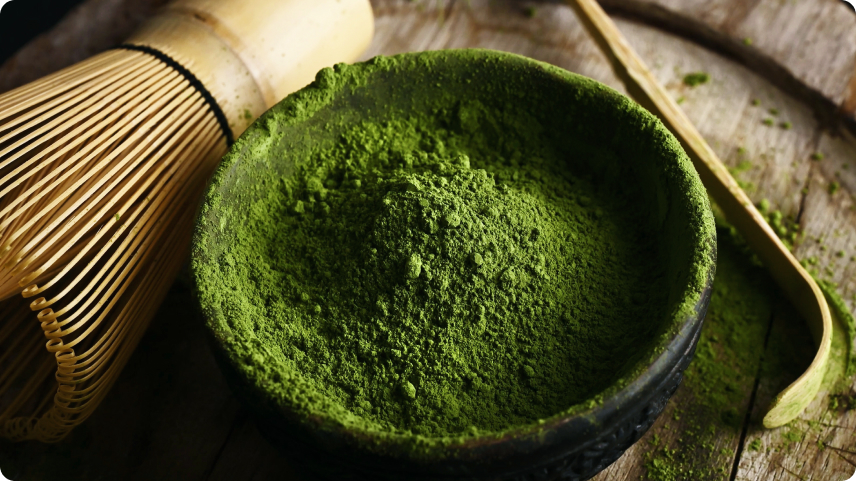Top 7 Health Benefits of Matcha Tea

What is matcha tea?
So, what actually is matcha? Matcha is a type of green tea powder of the Tencha variety commonly produced in Japan. The tea plants are grown in shade, with the bushes covered with bamboo mats to avoid excessive sunlight. In addition, the processing of the tea differs from that of conventional tea. Matcha green tea leaves are destemmed, deveined, and steamed shortly after harvest, while conventional green tea undergoes trying, tumbling, and steaming instead.
The processing and growth conditions are responsible for the higher amounts of beneficial compounds, amino acids, chlorophyll, and theanine. These compounds give matcha tea powder its unique taste and vibrant color.
Matcha green tea powder contains many beneficial compounds that positively affect our health. It contains a lot of polyphenols, which can account for up to 30% of its dry weight. Polyphenols are super-powerful antioxidants that behave in a similar way to vitamins C and E.

What types of antioxidants are in matcha tea? Some polyphenols in matcha include catechins, which are:
- Epicatechin (EC)
- Epicatechin-3-gallate (ECG)
- Epigallocatechin (EGC)
- Epigallocatechin-3-gallate (EGCG), which is the most abundant catechin in matcha tea
These catechins are responsible for most of matcha’s benefits. They not only quench free radicals but also support the detoxifying activity of other enzymes that fight against free radicals.
In addition to catechins, matcha contains caffeine. The amounts of caffeine in matcha tea differ according to the time of harvest and the age of the leaves used to make the powder. However, on average, matcha is quite high in caffeine, so for those sensitive to it, using matcha in the morning may be a good idea. Caffeine also has antioxidant activity, helping reduce oxidative stress and may have anti-inflammatory effects.
Matcha tea also contains other compounds that positively affect us. Pay attention to the quality of matcha to ensure you're getting the best matcha tea.
The health benefits of matcha
Is there any evidence of the hype that surrounds the benefits of matcha tea that it promises? Yes. We know that green tea is generally good for you, and the scientific world has been looking at what compounds in green tea can support our health and cognition and help us do and feel our best. Matcha contains many of the nutrients generally found in green tea. It may have higher doses of certain nutrients, such as l-theanine, compared to other types of green tea as well. Therefore, matcha can be a great addition to your routine to support many aspects of general well-being.
So, what are some benefits people see with matcha usage?

Benefit #1 Stress-relieving effects
Every one of us feels stress at a certain point in our lives. It might be due to your job, something not going quite right at home, or simply because you've taken on too much. We can help ourselves mitigate stress by adjusting our nutrition.
Matcha green tea can be a great tool for helping the body withstand stress. It contains theanine, an amino acid that has a stress-reducing effect. In addition, it has arginine, another amino acid that can enhance theanine’s effect. Matcha may be able to reduce stress and the nervousness that accompanies it. However, this may only be possible if there is a certain ratio of caffeine and EGCG compared to theanine and arginine, as caffeine and EGCG are stimulants.
If you’re looking for more tips on supporting your body through stress, check out our relevant posts, like:
- Effective ways of coping with stress.
- Ten tips for managing a healthy lifestyle and work-life balance.
Benefit #2 Protecting the liver
Many of us would like to take better care of our livers. After all, the liver is an important organ. It supports our immunity and digestive functions, stores vitamins, and plays a role in supporting our metabolism and removing waste products from the body.
We’re still trying to understand the effects of matcha tea and its components on liver health. It appears that matcha can affect how we process fats and sugars. It may help prevent lipid accumulation and high levels of fats in the blood. In addition, it may help prevent high levels of glucose in the blood. It appears to do so by beneficially affecting our metabolic function. It may also prevent fat buildup in liver cells, especially when you have a high-fat diet.
However, it's vital to note that not everyone may benefit from taking green tea for liver health. It’s a good idea to consult with a medical professional before starting to take matcha regularly for liver support.
If you're looking for more ways to support your liver, we've looked at the best foods for the liver in our recent blog post. Remember that a healthy and balanced lifestyle is vital for liver health, so do your best to stick to an active routine.
Benefit #3 Boosting brain function
The caffeine in matcha may be responsible for supporting brain function. It has been shown to reduce reaction time and mental fatigue. In addition, matcha contains theanine, which may support attention and reaction. Together with catechins, caffeine and theanine may support brain function, especially under stressful conditions.
There’s been some more in-depth work on whether theanine can support cognition. L-theanine, an amino acid found in green tea, including matcha, has been noted for its memory-related benefits. L-theanine was found to reduce reaction time to attention tasks, increase the number of correct answers and improve working memory. Therefore, matcha’s l-theanine content can help support our brain’s functions.
In addition, matcha may help with cognitive function as we age. EGCG is one of the catechins that has anti-inflammatory and antioxidant capacities, which may support cognition. Matcha's high content of vitamin K and lutein is also beneficial for brain function. Vitamin K is a necessary nutrient for the central nervous system, and getting enough of it is associated with better memory and fewer memory complaints. Lutein is a carotenoid and is associated with our ability to recall words.
Therefore, adding some matcha to your routine to support the brain as you age can be a good idea. Alternatively, you may find it an excellent alternative to coffee when you're in a highly stressful situation, whether that's because you're giving a presentation at work or taking an exam.
Benefit #4 Boosting energy levels
Ever find yourself feeling super tired? You’re not alone. This may especially be the case if you’re someone who trains often and feels fatigue after a long day. Matcha may help you fight subjective fatigue after training, while helping your muscle adapt to training loads.
It may also be an excellent alternative to your morning coffee if you're not a big fan of the post-caffeine crash.

Benefit #6 Boosting metabolism
Our metabolism is the collection of all the chemical processes happening in the body. Matcha may help us regulate our fat and blood sugar levels. Matcha green tea appears to affect the gut-liver axis, helping to mitigate the effects of a diet high in fat. It may also protect us from developing obesity and storing fats.
Many of us associate a boosted metabolism as our ability to burn fat and lose weight. It appears that green tea is able to support weight loss when combined with exercise and a balanced diet, so matcha may help in this quest.
The best matcha tea for weight loss is one of high quality. However, if your goal is to lose some weight, don't forget about the benefits of an active lifestyle and getting plenty of sleep.
If you're looking to lose weight, you may find these blog posts helpful:
- How to lose weight in a safe way
- Which diet can help you lose weight?
- What are fat burners, and how can they help you lose weight
- How to lose weight and gain muscle at the same time
- Best weight loss supplements
- What’s the connection between sleep and weight loss?
Benefit #7 Reducing risks of cancer
Many of us are worried about the C-word. Many of us know people affected by cancer. Dietary strategies may help us reduce the risks of developing this pathology. Matcha may be a great addition to an anti-cancer diet.
There’s definitely more research we need to do, but the results so far have been promising. Matcha may be able to inhibit the spreading of breast cancer stem cells due to changing cellular metabolism and signaling. Matcha may lead to a reduction in tumor size. Meta-analyses have found an inverse association between green tea consumption and certain types of cancer. This means that a higher consumption of green tea tends to be associated with lower chances of developing cancer.
Therefore, matcha green tea may be able to lower our chances of getting cancer. However, we still have more to learn about how exactly matcha works and what the best way to use it is.
Matcha tea has a variety of benefits for general health. It is rich in polyphenols and beneficial compounds that can support overall health and address specific concerns. Matcha tea powder can be a great way to enrich a varied diet and a healthy lifestyle with additional beneficial plant compounds. The brewing of matcha tea can become a comforting ritual or an occasional healthy indulgence. Remember that matcha tea should be an addition to your routine rather than a replacement for nutritious meals and plenty of activity.



